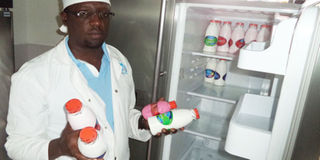Getting more from milk

After realising that selling milk alone would not fetch all the money they needed, the Matsiko family decided to do value addition and it has paid off. Photo by Zadock Amanyisa.
The Farm Clinic is 21 days away and one of the key areas it will focus on is value addition and markets. One of the people who appreciate the value addition are the owners of Kabeihura farm in Mashonga, Kyamuhunga Sub-county, Bushenyi District.
What started out as a mixed farm in 1975 decided to focus on milk production with about 15 herders.
Over the years, the family-owned farm expanded and has more than 50 cows.
Starting out
According to Mark Matsiko, who runs the operations at the farm, the beginning was challenging. They had no cooling facilities and they had to transport milk to Kasese District in jerry cans.
“We had to make sure that our milk reaches Kasese by mid-day. We used to sell it in hotels. We sold part of the milk here in Bushenyi. We could not take it far because transportation was a big challenge. We transported milk using bicycles,” Matsiko recalls.
Thankfully things changed. In 1989, a milk collection centre was set up at Mashonga which is not far from the farm. “With the centre, a litre of milk went for Shs50.”
The growth
In 2015, the family realized that selling milk alone would not bring in enough money. “We also wanted to create employment for us and the people around. It is from there that Kabeihura Farm started adding value to their milk and they branded their products, Kazifresh.
Packaging
They produce yoghurt which they pack in different flavours; plain, strawberry and vanilla. They sell the products in Ishaka, Bushenyi, Mbarara, Kasese, Ibanda and other places.
Their products are packed in packets, bottles and cups.
Packets are in the range of 250-400mg, bottles in 300-500mg, and cups in 250-50mg. Packets are sold between Shs700 and Shs1,100, bottles at Shs1,200 and Shs2,200 whereas cups go for Shs1,250 and Shs2,250. From this venture, the farm makes Shs45m while the milk fetches Shs24m.
Marketing
Matsiko says they distribute their products to wholesale and retailers.
The process
They milk the cows in the morning and evening. When they have got enough, the milk is transferred from the milking palour to the processing unit where it is separated into two sections of plain and ready to process milk.
Milk for processing is pasteurized. The one for yoghurt is put in a cooler at 4 degrees centigrade where it is kept overnight for processing.
During pasteurisation, additives such as sugar, stabilisers and thickeners are added and the product is stored at 90 degrees centigrade.
It is then cooled at 44 degrees centigrade and pushed to inoculation stage where good bacteria is added for fermenting the milk to turn it into yoghurt.
From there, it is taken to the incubation stage where it is held at 44 degrees centigrade for five hours to allow good bacteria to break down the milk sugars and produce lactic acid.
From there, the PH test is carried out to confirm whether the product has achieved the desired properties.
Once the PH is okay, the product goes for packaging where it is filled and sealed to get ready for distribution and market.
Preservation
The product is mainly maintained at 4 degrees centigrade in freezers and cooler boxes and has a shelf life of one month if it is stored below 10 degrees centigrade.
The equipment they use including the cooler, pasteurizer, incubator and freezers which cost about Shs500m.
Challenges
According to Matsiko, the enterprise uses electricity which is expensive yet the machines run on it. This has increased the cost of production thus affecting the profit margin.
“We also experience load shedding which affects our quality. Milk is a perishable commodity and it needs a stable temperature of 4 degrees centigrade which should be constant. This means you have to keep electricity on and constant,” he says.
Matsiko says they are tasked to look for ways of distributing the products using cooler boxes to maintain the temperatures which limits their distribution points.
The business has another challenge of local people shunning local products which forces them to take their products in other places.
Packaging is expensive yet they need to keep buying packets, bottles and cups from Kampala.
Lessons
Matsiko says there is always need to carry out a market survey to assess what the consumers want.
You must also have potential for production which is achieved by improving management practices.
There is always a need for cutting down the production costs by use of the modern methods of processing which makes work easier.
He urges people who want to venture in value addition to utilise opportunities such as the Farm Clinic.
Plans
Matsiko is looking at expanding the enterprise to 500 litres of yoghurt per day in a period of two years. He also wants to increase milk production to 600 litres per day which will expand his customer base.
If you go
Theme: Climate Smart Farming
Topics: Dairy, Banana, Passion fruits, Chili and Beans
Venue: Mbarara Zonal Agricultural Research & Development Institute (MBAZARDI)
When: Saturday May 27, 2017
Fee: Shs20,000 (includes meals and training) payable @ Monitor Mbarara Bureau,
Plot 4, Buremba Road, Mpororo Building
Time: 7am




